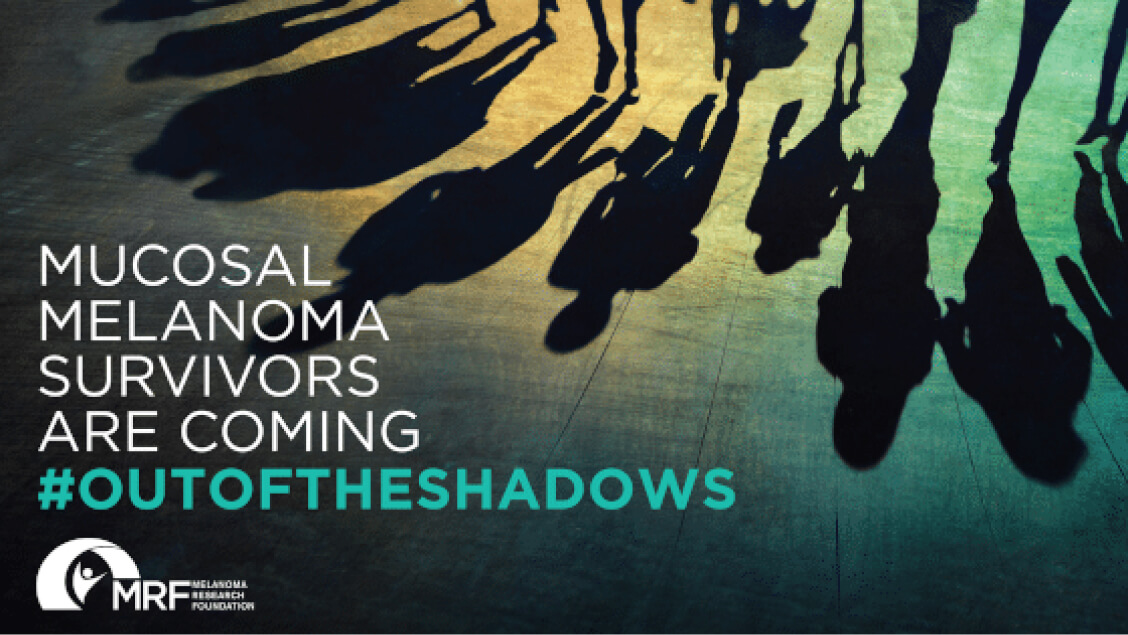January 27, 2025
Muscosal Melanoma
One of the rarest forms of melanoma, making up only about 1% of cases.
Understanding Mucosal Melanoma.
Mucosal melanoma is a rare form of melanoma, making up only about 1% of melanoma cases. As with other areas of the skin, melanocytes, the pigment producing cells of the body, are also present in the mucosal surfaces of the body, lining the sinuses, nasal passages, oral cavity, vagina, anus and other areas. Just like melanocytes in other parts of the body, these can transform into cancerous cells, resulting in mucosal melanoma.
Awareness Campaign
#OutOfTheShadows
Because mucosal melanoma is a rare disease and one that occurs in areas of the body that aren’t always comfortable to discuss, it can be challenging to find information and support. The MRF created the #OutOfTheShadows awareness campaign to feature patient stories, mucosal melanoma facts and additional educational resources. Read a guest blog post from self-described mucosal melanoma “thriver” James H. here, and learn more about additional members of the mucosal melanoma community through this video.

Mucosal Can Be Difficult to Identify Early On.
Approximately 50% of mucosal melanomas begin in the head and neck region, 25% begin in the ano-rectal region and 20% begin in the female genital tract. The remaining 5% include the esophagus, gallbladder, bowel, conjunctiva and urethra.1
Unlike most cases of melanoma of the skin, mucosal melanoma is not considered to be related to or affected by UV exposure. Additionally, there are no obvious identified risk factors, not even family history. Lacking an identifiable culprit and given its rare occurrence, most cases of mucosal melanoma are quite advanced once identified. Read more about possible signs and symptoms of mucosal melanoma.
For more information, download the Mucosal Melanoma Fact Sheet.

Mucosal Melanoma Research Articles
A 2023 comprehensive review of primary mucosal melanomas in the National Library of Medicine provides a helpful overview of mucosal melanoma epidemiology and diagnosis.
View the Mucosal Melanoma Webinar Series
- Medical Therapy for Mucosal Melanoma – presented by Alexander Shoushtari, MD
- Mucosal Melanoma Awareness – presented by Alexander Shoushtari, MD and Kathy Hickey, melanoma survivor
- Clinical Presentation and Biology of Mucosal Melanoma – presented by Richard Carvajal, MD
- Local-Regional Treatment for Mucosal Melanoma – presented by Marlana Orloff, MD
- Medical Therapy for Mucosal Melanoma – presented by Alexander Shoushtari, MD
- Biomarker Studies for Mucosal Melanoma – presented by Michael Atkins, MD
NEW! Mucosal Melanoma White Paper
Read our new white paper: Proceedings from the Melanoma Research Foundation Mucosal Melanoma Meeting from our December 2022 mucosal meeting.

Citations
Content last reviewed: February 2024
Mihajlovic M, Vlajkovic S, Jovanovic P, Stefanovic V. Primary mucosal melanomas: a comprehensive review. Int J Clin Exp Pathol. 2012;5(8):739-753.






